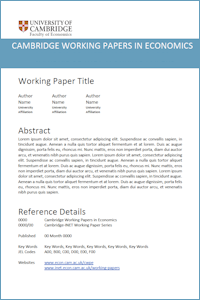
Munshi, K.
Caste and the Indian Economy
CWPE1759
Abstract: Caste plays a role at every stage of an Indian's economic life; in school, university, the labor market, and into old age. The influence of caste extends beyond private economic activity into the public sphere, where caste politics determines access to public resources. The aggregate evidence indicates that there has been convergence in education, occupations, income, and access to public resources across caste groups in the decades after independence. Some of this convergence is likely due to affirmative action, but caste-based networks could also have played an equalizing role by exploiting the opportunities that became available in a globalizing economy. Ethnic networks were once active in many advanced economies, but ceased to be salient once markets developed. With economic development, it is possible that caste networks will cease to be salient in India. The affirmative action programs may also be rolled back and (statistical) discrimination in urban labor markets may come to an end, if and when there is convergence across caste groups. In the interim period, however, it is important to understand the positive and negative consequences of caste involvement across a variety of spheres in the Indian economy.
Keywords: Caste, Affirmative Action, Community networks, Migration, Mobility, Education, Business, Risk-Sharing, Public Goods, Politics
JEL Codes: H41 I25 J12 J62 J71 O15
Author links:
PDF: https://www.econ.cam.ac.uk/research-files/repec/cam/pdf/cwpe1759.pdf 
Open Access Link: https://doi.org/10.17863/CAM.33979
